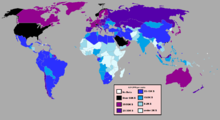Money
From Wikipedia, the free encyclopedia
For other uses, see Money (disambiguation).

A sample picture of a fictional ATM card. The largest part of the
world's money exists only as accounting numbers which are transferred
between financial computers. Various plastic cards and other devices
give individual consumers the power to electronically transfer such
money to and from their bank accounts, without the use of currency.
Money is historically an emergent market phenomenon establishing a commodity money, but nearly all contemporary money systems are based on fiat money.[4] Fiat money, like any check or note of debt, is without intrinsic use value as a physical commodity. It derives its value by being declared by a government to be legal tender; that is, it must be accepted as a form of payment within the boundaries of the country, for "all debts, public and private"[citation needed]. Such laws in practice cause fiat money to acquire the value of any of the goods and services that it may be traded for within the nation that issues it.
The money supply of a country consists of currency (banknotes and coins) and bank money (the balance held in checking accounts and savings accounts). Bank money, which consists only of records (mostly computerized in modern banking), forms by far the largest part of the money supply in developed nations.[6][7][8]
Contents
- 1 Etymology
- 2 History
- 3 Functions
- 4 Money supply
- 5 Types of money
- 6 Monetary policy
- 7 See also
- 8 Reference
Etymology
The word "money" is believed to originate from a temple of Hera, located on Capitoline, one of Rome's seven hills. In the ancient world Hera was often associated with money. The temple of Juno Moneta at Rome was the place where the mint of Ancient Rome was located.[9] The name "Juno" may derive from the Etruscan goddess Uni (which means "the one", "unique", "unit", "union", "united") and "Moneta" either from the Latin word "monere" (remind, warn, or instruct) or the Greek word "moneres" (alone, unique).
In the Western world, a prevalent term for coin-money has been specie, stemming from Latin in specie, meaning 'in kind'.[10]
 HistoryMain article: History of moneyThe use of barter-like methods may date back to at least 100,000 years ago, though there is no evidence of a society or economy that relied primarily on barter.[11] Instead, non-monetary societies operated largely along the principles of gift economics and debt.[12][13] When barter did in fact occur, it was usually between either complete strangers or potential enemies.[14]
HistoryMain article: History of moneyThe use of barter-like methods may date back to at least 100,000 years ago, though there is no evidence of a society or economy that relied primarily on barter.[11] Instead, non-monetary societies operated largely along the principles of gift economics and debt.[12][13] When barter did in fact occur, it was usually between either complete strangers or potential enemies.[14]
Many cultures around the world eventually developed the use of commodity money. The shekel was originally a unit of weight, and referred to a specific weight of barley, which was used as currency.[15] The first usage of the term came from Mesopotamia circa 3000 BC. Societies in the Americas, Asia, Africa and Australia used shell money – often, the shells of the cowry (Cypraea moneta L. or C. annulus L.). According to Herodotus, the Lydians were the first people to introduce the use of gold and silver coins.[16] It is thought by modern scholars that these first stamped coins were minted around 650–600 BC.[17]
 The system of commodity money eventually evolved into a system of representative money.[citation needed] This occurred because gold and silver merchants or banks would issue receipts to their depositors – redeemable for the commodity money deposited. Eventually, these receipts became generally accepted as a means of payment and were used as money. Paper money or banknotes were first used in China during the Song Dynasty. These banknotes, known as "jiaozi", evolved from promissory notes
that had been used since the 7th century. However, they did not
displace commodity money, and were used alongside coins. In the 13th
century, paper money became known in Europe through the accounts of
travelers, such as Marco Polo and William of Rubruck.[18] Marco Polo's account of paper money during the Yuan Dynasty is the subject of a chapter of his book, The Travels of Marco Polo, titled "How the Great Kaan Causeth the Bark of Trees, Made Into Something Like Paper, to Pass for Money All Over his Country."[19] Banknotes were first issued in Europe by Stockholms Banco in 1661, and were again also used alongside coins. The gold standard, a monetary system
where the medium of exchange are paper notes that are convertible into
pre-set, fixed quantities of gold, replaced the use of gold coins as
currency in the 17th-19th centuries in Europe. These gold standard notes
were made legal tender,
and redemption into gold coins was discouraged. By the beginning of the
20th century almost all countries had adopted the gold standard,
backing their legal tender notes with fixed amounts of gold.
The system of commodity money eventually evolved into a system of representative money.[citation needed] This occurred because gold and silver merchants or banks would issue receipts to their depositors – redeemable for the commodity money deposited. Eventually, these receipts became generally accepted as a means of payment and were used as money. Paper money or banknotes were first used in China during the Song Dynasty. These banknotes, known as "jiaozi", evolved from promissory notes
that had been used since the 7th century. However, they did not
displace commodity money, and were used alongside coins. In the 13th
century, paper money became known in Europe through the accounts of
travelers, such as Marco Polo and William of Rubruck.[18] Marco Polo's account of paper money during the Yuan Dynasty is the subject of a chapter of his book, The Travels of Marco Polo, titled "How the Great Kaan Causeth the Bark of Trees, Made Into Something Like Paper, to Pass for Money All Over his Country."[19] Banknotes were first issued in Europe by Stockholms Banco in 1661, and were again also used alongside coins. The gold standard, a monetary system
where the medium of exchange are paper notes that are convertible into
pre-set, fixed quantities of gold, replaced the use of gold coins as
currency in the 17th-19th centuries in Europe. These gold standard notes
were made legal tender,
and redemption into gold coins was discouraged. By the beginning of the
20th century almost all countries had adopted the gold standard,
backing their legal tender notes with fixed amounts of gold.
After World War II, at the Bretton Woods Conference, most countries adopted fiat currencies that were fixed to the US dollar. The US dollar was in turn fixed to gold. In 1971 the US government suspended the convertibility of the US dollar to gold. After this many countries de-pegged their currencies from the US dollar, and most of the world's currencies became unbacked by anything except the governments' fiat of legal tender and the ability to convert the money into goods via payment.
Functions
William Stanley Jevons famously analyzed money in terms of four functions: a medium of exchange, a common measure of value (or unit of account), a standard of value (or standard of deferred payment), and a store of value. By 1919, Jevons's four functions of money were summarized in the couplet: "Money's a matter of functions four, a Medium, a Measure, a Standard, a Store."[20] This couplet would later become widely popular in macroeconomics textbooks.[21]
Most modern textbooks now list only three functions, that of medium of exchange, unit of account, and store of value, not considering a standard of deferred payment as a distinguished function, but rather subsuming it in the others.[4][22][23]
There have been many historical disputes regarding the combination of money's functions, some arguing that they need more separation and that a single unit is insufficient to deal with them all. One of these arguments is that the role of money as a medium of exchange is in conflict with its role as a store of value: its role as a store of value requires holding it without spending, whereas its role as a medium of exchange requires it to circulate.[5] Others argue that storing of value is just deferral of the exchange, but does not diminish the fact that money is a medium of exchange that can be transported both across space and time.[24] The term 'financial capital' is a more general and inclusive term for all liquid instruments, whether or not they are a uniformly recognized tender.
Medium of exchange
Main article: Medium of exchangeWhen money is used to intermediate the exchange of goods and services, it is performing a function as a medium of exchange. It thereby avoids the inefficiencies of a barter system, such as the 'double coincidence of wants' problem.
Unit of account
Main article: Unit of accountA unit of account is a standard numerical unit of measurement of the market value of goods, services, and other transactions. Also known as a "measure" or "standard" of relative worth and deferred payment, a unit of account is a necessary prerequisite for the formulation of commercial agreements that involve debt. To function as a 'unit of account', whatever is being used as money must be:
- Divisible into smaller units without loss of value; precious metals can be coined from bars, or melted down into bars again.
- Fungible: that is, one unit or piece must be perceived as equivalent to any other, which is why diamonds, works of art or real estate are not suitable as money.
- A specific weight, or measure, or size to be verifiably countable. For instance, coins are often milled with a reeded edge, so that any removal of material from the coin (lowering its commodity value) will be easy to detect.
Store of value
Main article: Store of value
To act as a store of value, a money must be able to be
reliably saved, stored, and retrieved – and be predictably usable as a
medium of exchange when it is retrieved. The value of the money must
also remain stable over time. Some have argued that inflation, by reducing the value of money, diminishes the ability of the money to function as a store of value.[4]Standard of deferred payment
Main article: Standard of deferred payment
While standard of deferred payment is distinguished by some texts,[5] particularly older ones, other texts subsume this under other functions.[4][22][23] A "standard of deferred payment" is an accepted way to settle a debt – a unit in which debts are denominated, and the status of money as legal tender,
in those jurisdictions which have this concept, states that it may
function for the discharge of debts. When debts are denominated in
money, the real value of debts may change due to inflation and deflation, and for sovereign and international debts via debasement and devaluation.
Aucun commentaire:
Enregistrer un commentaire